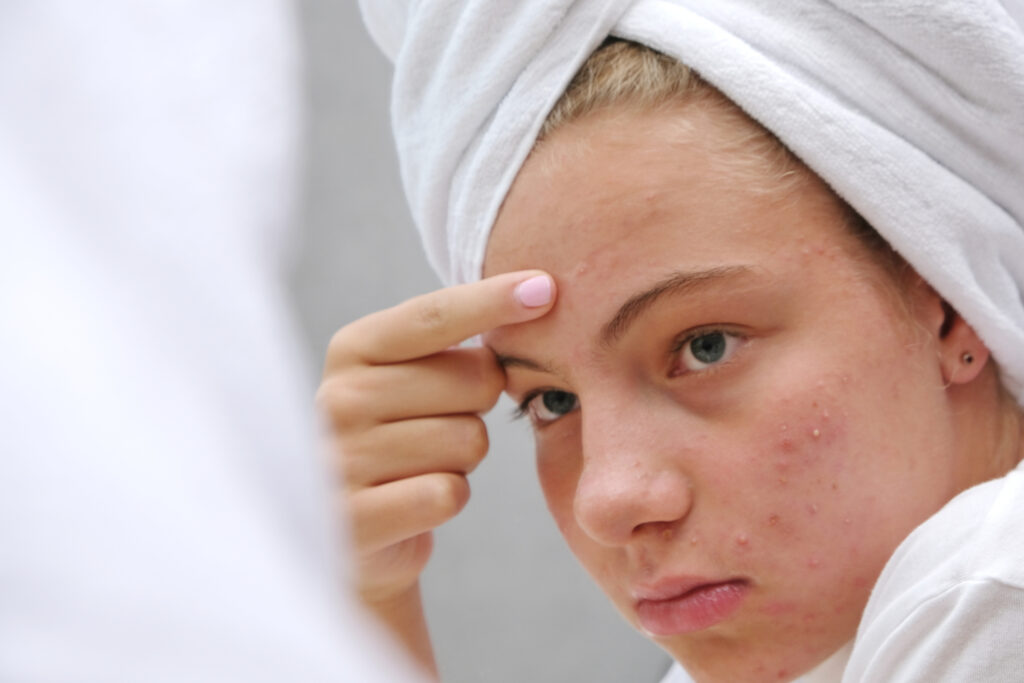Types of Acne: Causes, Treatments & Prevention Tips

Acne is an extremely common skin condition. While often associated with teenagers, it can also impact adults and children. Learn what causes acne, treatment options, and prevention tips to keep your skin healthy.
What Causes Different Types of Acne?
Acne cases range from mild to severe. Which type do you have?
Whiteheads and Blackheads
These non-inflammatory types of acne don’t usually cause pain or swelling. Whiteheads are closed clogged pores, while blackheads are open pores filled with excess oil and dead skin cells. Although blackheads appear dark, it’s not dirt—it’s from the pore being exposed to the air.
Papules and Pustules
Papules are small, red bumps that develop when pores become inflamed. Pustules are similar but filled with pus, which gives them a white or yellow head. These types of acne are often tender, a sign of inflammation. Factors like stress, hormonal changes, and bacteria trigger these blemishes.
Nodules and Cysts
The most severe forms of acne are nodules and cysts, which develop deep within the skin. Nodules are hard, painful lumps, while cysts are filled with pus and often larger than typical pimples. Both types are prone to scarring and can be difficult to treat without professional help. Hormones, genetics, and excess oil production are common causes.
Treatment Options
Effective acne treatment depends on the type and severity.
Over-the-Counter Topical Treatments
- Benzoyl peroxide reduces bacteria and inflammation. It’s commonly used in mild to moderate acne.
- Salicylic acid exfoliates the skin and prevents clogged pores, effective for blackheads and whiteheads.
- Retinoids like tretinoin and adapalene are vitamin A derivatives that unclog pores and promote skin cell turnover. Retinoids are available in prescription and over-the-counter formulas.
Prescription Medications
- Topical antibiotics like clindamycin and erythromycin kill acne-causing bacteria. They are often combined with benzoyl peroxide.
- Oral antibiotics such as doxycycline and minocycline are prescribed to reduce bacteria and inflammation.
- Hormonal treatments like birth control pills or spironolactone regulate hormones that cause excess oil production.
- Isotretinoin (Accutane) is an oral retinoid used for severe cystic acne.
Professional Treatments
- Corticosteroid injections reduce swelling and help large, painful cysts heal faster.
- Laser and light therapy reduces acne-causing bacteria and improves acne scars.
- Chemical peels remove blackheads and whiteheads to prevent further breakouts.
Acne Prevention Tips
It’s not always possible to prevent acne breakouts, but take these steps to reduce your risk:
- Wash your face twice a day with a gentle cleanser.
- Choose oil-free skincare and makeup products labeled “non-comedogenic,” meaning they won’t clog your pores.
- Avoid picking or squeezing, which only pushes bacteria deeper into the skin and increases the risk of scarring.
- Manage stress with meditation or breathing exercises to reduce oil production.
- Watch what you eat, knowing that sugary snacks, white bread, and dairy products can trigger acne.
Contact Swinyer Woseth Dermatology
If you’re frustrated by acne breakouts, turn to Swinyer Woseth Dermatology. Our skilled dermatologists can design an acne treatment plan just for you, from topical therapies to advanced laser treatments and chemical peels. Whether you’re dealing with mild breakouts or more severe acne, we can help you achieve clearer, healthier skin. To get started, schedule an appointment at our Salt Lake City or South Jordan clinic.
